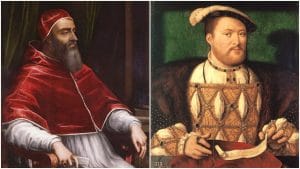 On this day in history, 23rd March 1534, Pope Clement VII declared that the marriage of Henry VIII and Catherine of Aragon “always hath stood, and still doth stand, firm and canonical […] and that the aforesaid Henry king of England is and shall be bound and obstrict to the matrimonial society and cohabitation with the said lady Katherine his lawful wife and queen, to bold end maintain her with such love and princely honour, as becometh a loving husband, and his kingly honour, to do”, which, of course, was a bit of a problem seeing as Henry VIII had been married to Anne Boleyn for over a year.
On this day in history, 23rd March 1534, Pope Clement VII declared that the marriage of Henry VIII and Catherine of Aragon “always hath stood, and still doth stand, firm and canonical […] and that the aforesaid Henry king of England is and shall be bound and obstrict to the matrimonial society and cohabitation with the said lady Katherine his lawful wife and queen, to bold end maintain her with such love and princely honour, as becometh a loving husband, and his kingly honour, to do”, which, of course, was a bit of a problem seeing as Henry VIII had been married to Anne Boleyn for over a year.
As for Mary, the king’s daughter by Catherine of Aragon, the Pope declared that she “standeth, and shall stand, lawful and legitimate”. Pope Clement also threatened the king with excommunication if he did not abandon Anne and return to Catherine.
You can read the papal bull at http://www.thereformation.info/Bull%201534.htm.
While the Pope was issuing that bull, Parliament in England was passing the First Act of Succession. This act declared the validity of Henry VIII’s marriage, to Anne Boleyn, and recognised the rights of their issue to inherit the throne. According to Parliament, Elizabeth, Henry’s daughter by Anne Boleyn, was legitimate and was the heir to the throne, while the Pope viewed Mary as legitimate and the heir to the throne. Oh dear!
The Act of Succession also required subjects to swear an oath renouncing any foreign authority and recognising Anne Boleyn as Henry VIII’s wife and their children as legitimate heirs to the succession. Click here to read more
I have decided a while ago that if I lived in England between 1533 and 1579 I would have been in a constant state of confusion as to whose marriage was lawful, who was meant to be legitimate, who was in the linecof succession, who was out this week, let alone just what am I meant to be religiously this year? As Claire says….oh dear what a mess. I think they had some form of uniformity by 1579, because the first act in 1559 had passed but gone through some changes. But then we also had the debate that led to the King James and the Puritans and then a compromise under Charles ii, then Catholic again under James, then the Presbyterian influence under William and Mary and the final changes under the Georges. And now anything goes. I think I need to lie down.
Yes, confusing times, plus if you were a normal person, rather than a courtier, you probably wouldn’t be that up to date on news at court. Confusing times!
In those days people must have just heard news from village gossip word of mouth etc. Those who served in wealthy households were much better informed as they could pick up the latest from listening to dinner table talk, and maybe listening at keyholes! But yes as soon as something happens today the media broadcasts it immediately, in the Second World War the public at home had to rely on the newspapers to inform them how the troops were doing and what the enemy was upto, television then came along and it was a fantastic advancement and changed people’s lives forever, yet in Tudor times and for several hundred years afterwards the ordinary folk were kept in the dark about a lot of things, especially those in the country, London folk were better informed they knew for instance when Henry was planning to put aside his first wife and the rumours spread fast yet country folk must have been kept in the dark fir several weeks before they heard anything, very frustrating especially in view of the most important events like the supremacy act and England break with Rome, the sacking of the monasteries etc, unless of course you lived near one and you knew or were related to one of the monks or nuns.